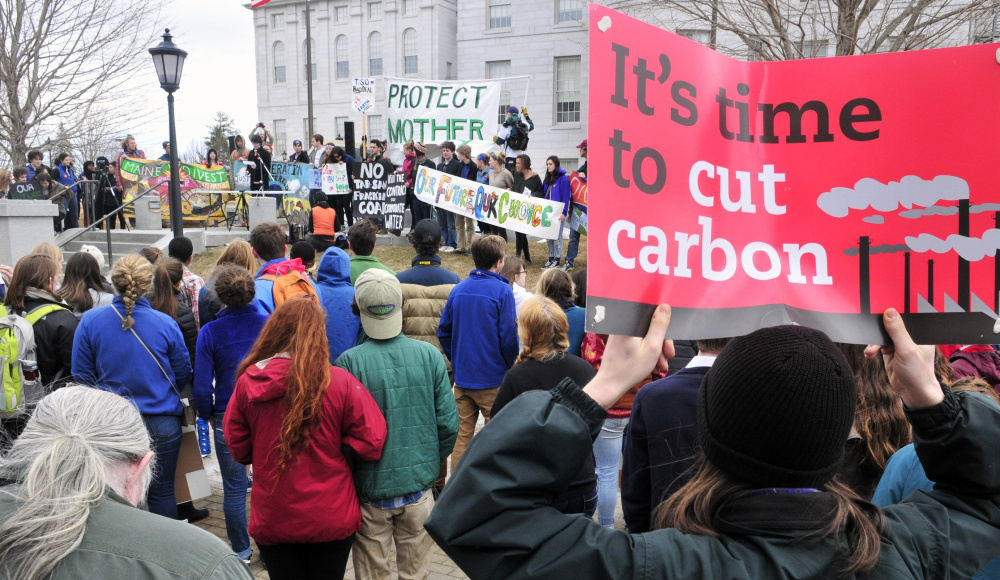The politics of climate change are starting to resemble the surface of a melting glacier split by crevices. We appear to be at a shear zone, a major discontinuity between the perspective of most world citizens and the surreal stance held by temporary occupants of some high-level Washington offices.
Needless to say, shear zones are marked by great friction.
This country’s new president confounds other heads of state, at least 190 of whom acknowledge the critical need for climate action. Leaders around the globe are aghast at our president’s cavalier dismissal of global warming, with “jokes” about it being a Chinese hoax and claims not to be “a big believer” – as if science were just another reality game show.
To feel less isolated, the president is stacking his Cabinet with those who share his resistance to accepted science. (One being considered as a science adviser sees climate researchers as a “cult,” saying “they’re glassy-eyed and they chant.”)
Oval Office extremists start to look like they’re not just on the far side of a crevice, but on an iceberg that has calved and is floating off – wholly disassociated.
Back on the glacier’s mainstem, seven out of 10 Americans understand global warming is happening. More than half realize that the primary cause is combustion of fossil fuels (with humans changing the climate 170 times faster than natural forces, by one recent estimate).
Even among voters who support the president, a survey conducted last November by researchers at Yale and George Mason universities found that half acknowledge global warming is happening. Fully 73 percent believe the U.S. should start using more renewable energy.
A poll in January reported that two-thirds of registered American voters place priority on developing alternative energy sources while only a third favor expanded production of fossil fuels.
Yet the president’s energy plan commits to “maximize the use of American resources” without any mention of solar, wind, hydro or geothermal power.
The fissure between federal energy policy and public opinion widens further in relation to slowing greenhouse gas emissions. Polls find strong support (fully 78 percent of voters in the Yale survey) for taxing or regulating those forms of pollution. Two of three registered voters approve of a revenue-neutral carbon tax (where proceeds are rebated to households).
That idea is gaining traction in unexpected quarters. Three senior Republican statesmen recently proposed a Conservative Case for Climate Action, calling for a revenue-neutral tax on carbon dioxide of $40 per ton. The authors bill this free-market, limited-government approach as a sound “insurance policy” – in case those 97 percent of published climate scientists turn out to be right.
While a carbon tax could reduce emissions by 11 to 31 percent, House Republicans remain unpersuaded. In 2016, they unanimously supported a resolution declaring a carbon tax “detrimental” to American families and businesses.
Who might help align these politicians with the voting public, and with the firsthand experience of those confronting rising sea levels, increased flooding and more severe droughts?
State and municipal leaders are desperate for more climate realism at the federal level, but they hold little leverage. Making headway is particularly hard for states like Maine, where the governor looks to a refrigeration technician for energy policy guidance.
Business leaders could exert immense influence in Washington; they have already taken a firm stand on other executive actions, like the immigration ban. Yet corporate voices are notably absent in lobbying Congress and the president to support renewable energy, uphold the Paris climate agreement or pass a carbon tax.
As Marc Gunther writes in a recent article, businesses tend to adopt sound energy practices internally but resist open advocacy: “Many companies have pledged to reduce their own carbon footprints, curb waste, and buy renewable energy. But few are willing to spend political capital on behalf of the environment.”
Businesses may hesitate to intervene because they want tax and regulatory reform from the new president or fear being on the receiving end of Twitter missives. Now may be the time for citizens to lobby – not just legislators – but corporate leaders. Businesses need consumers and shareholders to remind them just how much greater is the risk of climate inaction.
A critical point to reiterate – in contacts with business and congressional leaders – is that we’re not a nation divided when it comes to the needs of our planet. A substantial majority of Americans stand ready to advance alternative energy and rein in fossil fuel emissions.
We just need leaders in Washington who are not adrift.
Marina Schauffler is a writer whose work is online at www.naturalchoices.com.
Send questions/comments to the editors.


